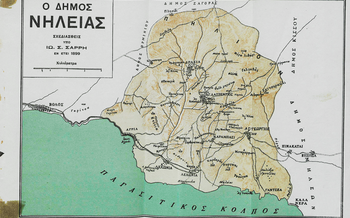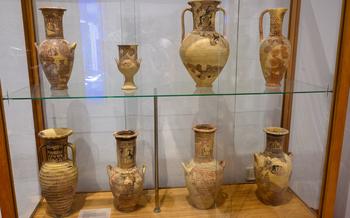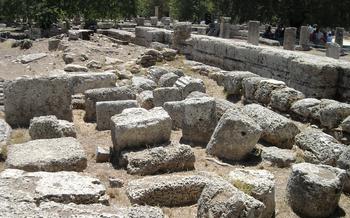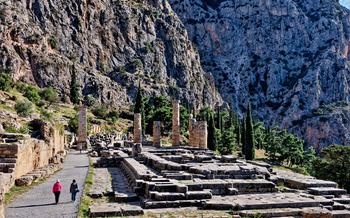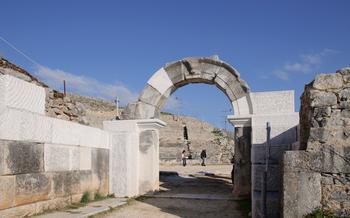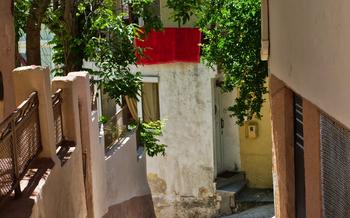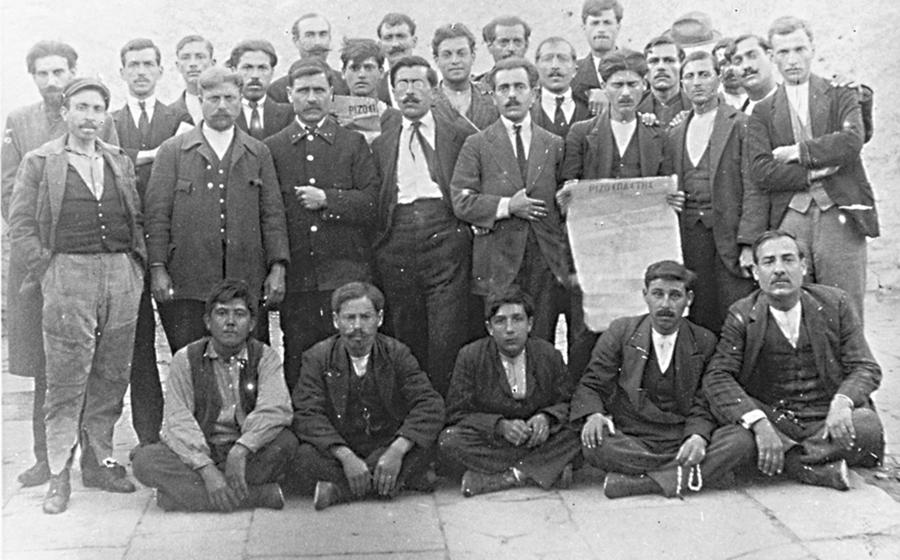
The Ancient Theater of Demetrias
- The Ancient Theater of Demetrias: A Timeless Masterpiece
- Location and Accessibility
- Historical Background of Demetrias
- Architecture and Design of the Theater
- Excavations and Restoration Efforts
- Acoustics and Performances
- The Theater's Role in the City's Festivals
- The Theater and the Ancient Greek Polis
- The Theater District and Surrounding Area
- The Theater and Its Impact on Modern Volos
- Tips for Visiting the Theater
- Photography and Social Media
- Educational Opportunities
- Insider Tip: Attend a Performance or Event
The Ancient Theater of Demetrias: A Timeless Masterpiece
In the heart of Volos, nestled amidst rolling hills and overlooking the shimmering waters of the Pagasetic Gulf, lies the Ancient Theater of Demetrias, a testament to the enduring legacy of ancient Greek culture. Constructed in the 3rd century BC during the reign of Demetrios Poliorketes, the theater served as a vibrant hub for entertainment, cultural expression, and civic life in the ancient city of Demetrias.
The theater's remarkable state of preservation, its impressive architectural features, and its exceptional acoustics have earned it recognition as one of the most significant ancient theaters in Greece. As you step through its gates, you will be transported back in time, to an era when tragedy, comedy, music, and dance captivated the hearts and minds of ancient audiences. The theater's awe-inspiring setting, surrounded by lush greenery and offering panoramic views of the surrounding landscape, further enhances its allure.
Whether you are a history buff, an architecture enthusiast, or simply someone who appreciates the beauty and artistry of ancient Greece, the Ancient Theater of Demetrias is a must-visit destination. Prepare to be captivated by its timeless grandeur as you explore this architectural masterpiece and immerse yourself in the rich cultural heritage of ancient Demetrias.
Location and Accessibility
The Ancient Theater of Demetrias is situated approximately 3 kilometers southeast of the city center of Volos, in central Greece. To reach the theater, visitors can take advantage of the convenient public transportation system. The theater is accessible by bus, with the nearest stop being a short walk away. For those who prefer to drive, ample parking is available in the vicinity of the theater.
The theater is open to the public daily, and admission fees are kept at a reasonable rate. Guided tours are available for those seeking a more in-depth understanding of the theater's history and significance. Alternatively, visitors can opt for self-guided exploration, using informative signage and brochures provided on-site.
Historical Background of Demetrias
Demetrias, founded in 290 BC by Demetrius Poliorcetes, played a pivotal role in the political and military landscape of ancient Greece. Strategically situated on the Pagasetic Gulf, Demetrias served as a vital port city, controlling access to the Aegean Sea and the fertile plains of Thessaly. The city's strategic location made it a prime target for conquest, and it witnessed numerous battles and sieges throughout its history.
Demetrias formed part of a defensive alliance known as the "Demetrias League," which included other powerful city-states such as Athens, Thebes, and Sparta. This alliance aimed to counter the growing influence of Macedonia under King Philip V. Demetrias's strategic importance was further enhanced by its proximity to the Via Egnatia, a major Roman road connecting the Adriatic and Aegean Seas.
Despite its strategic significance, Demetrias eventually declined due to political turmoil, natural disasters, and the rise of other regional powers. The city was abandoned in the 6th century AD, and its ruins lay buried for centuries until their rediscovery in the 19th century. Today, Demetrias stands as a testament to the rich history and cultural heritage of ancient Greece.
Architecture and Design of the Theater
The Ancient Theater of Demetrias stands as a testament to the architectural prowess of the ancient Greeks. With a seating capacity of approximately 5,000 spectators, the theater's vast dimensions allowed it to accommodate a large audience. The seating tiers, arranged in a semicircular fashion, provided excellent views of the stage from all angles. The theater's design ensured optimal acoustics, enabling performers to be heard clearly throughout the venue.
The stage, or orchestra, was a circular space located at the center of the theater. It served as the focal point for performances and was often adorned with intricate stage decorations. Behind the stage, a backdrop of painted panels or a permanent architectural structure provided a visual backdrop for the performances. The theater's design demonstrates a sophisticated understanding of acoustics and stagecraft, reflecting the high level of artistic achievement in ancient Greece.
Excavations and Restoration Efforts
The discovery of the Ancient Theater of Demetrias in the early 20th century sparked a wave of excitement and curiosity among historians and archaeologists. Initial excavations revealed the theater's impressive size and intricate design, hinting at its significance in ancient Demetrias. However, the site faced several challenges, including extensive damage and vegetation overgrowth.
Restoration efforts began in the 1960s, aiming to preserve and restore the theater to its former glory. Archaeologists meticulously removed layers of soil, uncovering the seating tiers, stage, and other architectural features. Skilled craftsmen employed traditional techniques to rebuild damaged sections, ensuring the theater's authenticity.
The restoration process involved meticulous attention to detail, with experts carefully studying ancient texts and comparing the theater to other well-preserved theaters in Greece. This comprehensive approach ensured that the restored theater remained faithful to its original design while maintaining its historical integrity.
Today, the Ancient Theater of Demetrias stands as a testament to the dedication and expertise of the restoration team. It serves as a living reminder of the city's rich cultural heritage and provides visitors with a glimpse into the grandeur of ancient Greek theater.
Acoustics and Performances
The Ancient Theater of Demetrias is renowned for its exceptional acoustics, which allowed performers to project their voices to the farthest reaches of the audience without amplification. This remarkable acoustic design was achieved through careful consideration of the theater's dimensions, materials, and shape. The steeply raked seating tiers, curved auditorium, and reflective stage wall ensured that sound waves were evenly distributed throughout the theater, creating an immersive and intimate atmosphere for performances.
The theater was a vibrant hub for a variety of performances, including plays, concerts, and festivals. Ancient Greek theater was a highly revered art form, and the theater in Demetrias played a crucial role in showcasing the talents of local and traveling performers. Dramas, comedies, and satyr plays were performed on the stage, often exploring themes of mythology, history, and contemporary society. These performances were not merely entertainment; they served as a means of education, social commentary, and moral instruction for the citizens of Demetrias.
In addition to theatrical performances, the theater also hosted musical concerts and festivals. Musicians, singers, and dancers from across the region flocked to Demetrias to perform on the theater's prestigious stage. These events were not only a celebration of the arts but also an opportunity for cultural exchange and community building. The theater provided a space for people from different backgrounds to come together, share their traditions, and experience the joy of live performances.
The Theater's Role in the City's Festivals
In ancient Demetrias, festivals and celebrations played a vital role in the cultural and religious life of the city. These festivities often revolved around the theater, which served as a central venue for showcasing local talent, celebrating religious rituals, and fostering a sense of community.
During these festivals, the theater would come alive with music, dance, and theatrical performances. Plays, concerts, and competitions were held, attracting people from all walks of life. The theater provided a platform for local artists to showcase their skills, while also offering entertainment and enjoyment to the citizens of Demetrias.
Religious rituals and ceremonies also found their home in the theater. The city's deities were honored through elaborate processions, sacrifices, and prayers. The theater's acoustics and spacious seating allowed for large gatherings and created a solemn atmosphere for these sacred events.
These festivals not only provided entertainment and religious expression but also strengthened the bonds of community among the people of Demetrias. The theater became a symbol of civic pride and unity, a place where citizens could come together to celebrate their shared heritage and culture.
The Theater and the Ancient Greek Polis
The ancient theater of Demetrias was not just a place of entertainment but also a vital part of the city's civic and cultural life. In ancient Greece, the theater played a crucial role in shaping the identity and unity of the polis, or city-state.
The theater served as a symbol of civic pride and cultural identity for the people of Demetrias. It was a place where citizens could gather to celebrate their shared heritage, values, and achievements. The performances held in the theater reflected the city's history, mythology, and religious beliefs, reinforcing a sense of community and belonging among the citizens.
Moreover, the theater was a space for public discourse and debate. Plays and other performances often addressed social, political, and philosophical issues, encouraging citizens to engage in critical thinking and discussion. The theater thus fostered a culture of intellectual curiosity and civic engagement, which was essential for the functioning of a democratic society.
Through its performances and events, the theater promoted social cohesion and unity within the polis. It provided a shared space where citizens from different backgrounds could come together to experience art, culture, and community. The theater helped to bridge social divides and create a sense of common purpose among the people of Demetrias.
The Theater District and Surrounding Area
The theater is situated in the heart of the ancient city of Demetrias, surrounded by other significant historical landmarks. Take some time to explore the theater district and discover the remnants of ancient walls, temples, and public buildings. These ruins offer a glimpse into the city's rich past and provide a deeper understanding of its urban layout.
In the vicinity of the theater, you will find several other attractions worth visiting. The Archaeological Museum of Volos houses a collection of artifacts excavated from the ancient city, including pottery, sculptures, and inscriptions. The Museum of the City of Volos showcases the history and culture of the city from ancient times to the present day.
After exploring the historical sites, take a break and relax in one of the charming cafes or restaurants in the area. Enjoy a traditional Greek meal or sip on a refreshing beverage while soaking up the ambiance of the ancient theater district.
To make the most of your visit, consider combining your trip to the theater with other activities in Volos. The city offers a variety of attractions, including stunning beaches, picturesque hiking trails, and lively nightlife. Whether you're interested in history, nature, or vibrant city life, Volos has something to offer every traveler.
The Theater and Its Impact on Modern Volos
The Ancient Theater of Demetrias stands as a testament to the rich cultural history of Volos. Its enduring presence has deeply influenced the cultural identity of the modern city. The theater has served as a source of inspiration for local artists, musicians, and creatives, who draw upon its legacy to create contemporary works of art that reflect the spirit of ancient Greece.
The theater has also been integrated into various contemporary events and festivals held in Volos. These events celebrate the city's rich heritage and showcase the theater as a vibrant cultural space. The theater's enduring presence serves as a reminder of the continuity and resilience of the Greek spirit, connecting the past with the present.
Tips for Visiting the Theater
Timing is Key: Plan your visit for the late afternoon or early evening to take advantage of the beautiful golden light that illuminates the theater. This timing also helps avoid the midday heat and crowds.
Dress Comfortably: Wear comfortable shoes as you'll be walking on uneven surfaces and exploring the surrounding area. Avoid flip-flops or high heels for safety reasons.
Bring Essentials: Limited facilities are available on-site, so bring water and snacks to stay hydrated and energized throughout your visit.
Guided Insight: Consider joining a guided tour to gain in-depth knowledge about the theater's history, architecture, and significance. Tours are often led by experts who can provide valuable insights.
Photography and Social Media
Capture the timeless beauty of the Ancient Theater of Demetrias through stunning photographs. With its picturesque setting against the backdrop of the Pagasetic Gulf, the theater offers endless opportunities for photography enthusiasts. Capture the grandeur of the stone tiers, the intricate carvings, and the panoramic views that stretch beyond the stage.
Share your experiences on social media using relevant hashtags like #AncientTheaterOfDemetrias, #Volos, and #Greece. Tag the theater's official social media accounts, @AncientTheaterOfDemetrias, for a chance to be featured and connect with a global community of history and culture enthusiasts.
Educational Opportunities
The Ancient Theater of Demetrias is not just a historical monument but also an educational resource for students and history enthusiasts. Educational tours and workshops can be organized at the theater to provide a deeper understanding of ancient Greek theater, history, and culture. These programs offer hands-on experiences, interactive activities, and expert insights into the theater's significance. Schools can arrange field trips to the theater for students to learn about ancient Greek drama, architecture, and performance practices. Additionally, the theater's website and educational materials provide valuable resources for research and further learning. By utilizing these educational opportunities, visitors can gain a deeper appreciation for the theater's cultural and historical significance.
Insider Tip: Attend a Performance or Event
To truly immerse yourself in the magic of the Ancient Theater of Demetrias, consider attending a performance or event held within its historic walls. The theater hosts a variety of events throughout the year, including plays, concerts, festivals, and cultural performances. These events offer a unique opportunity to experience the theater's exceptional acoustics and vibrant atmosphere while enjoying a captivating show.
Check the theater's official website or local listings for upcoming events and plan your visit accordingly. Whether you're a theater enthusiast, a music lover, or simply seeking a memorable experience, attending a performance at the Ancient Theater of Demetrias is an unforgettable way to connect with the past and embrace the cultural heritage of Volos.

